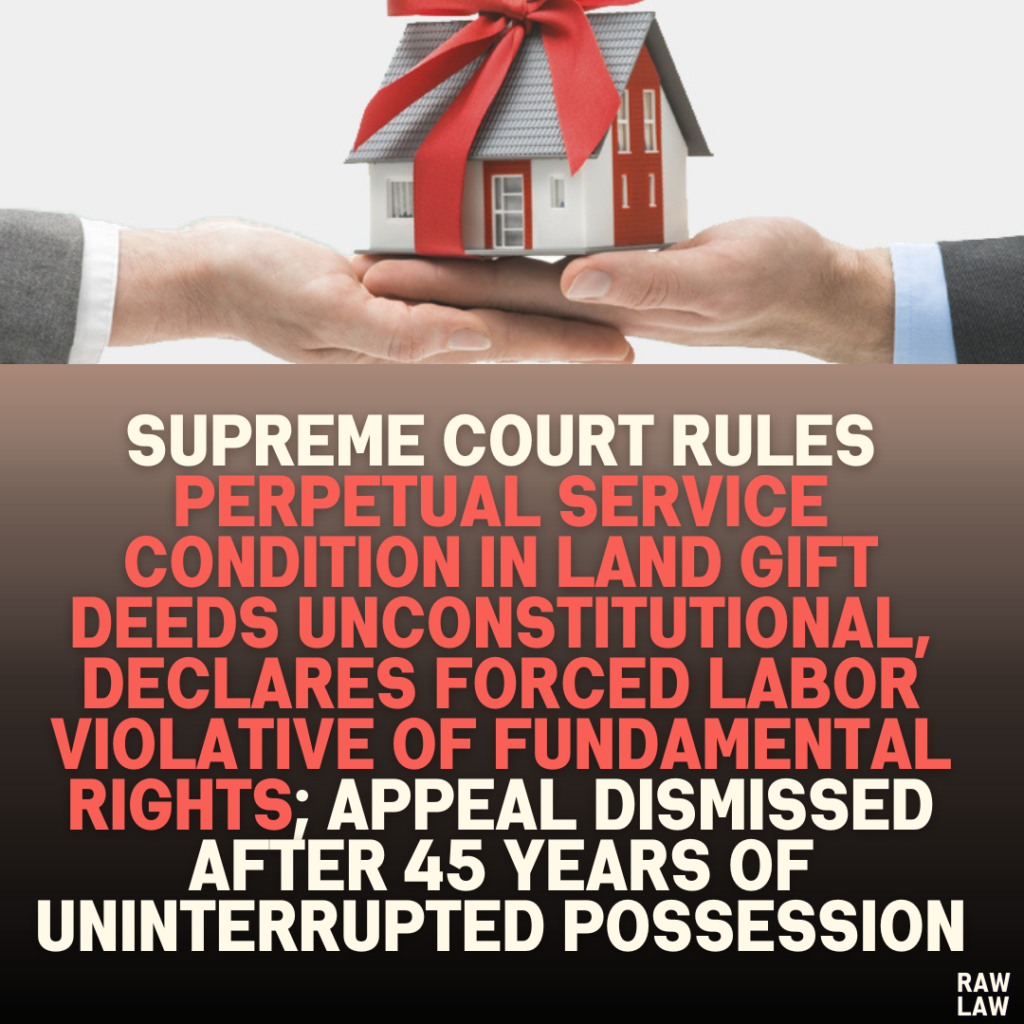Court’s Decision
The Supreme Court dismissed the appeal filed by the plaintiffs, who sought to reclaim land gifted by their predecessor. The Court upheld the Punjab & Haryana High Court‘s decision, ruling that the condition in the gift deed requiring perpetual service to the donor’s heirs was unconstitutional, amounting to forced labor under Article 23 of the Constitution. Furthermore, the Court emphasized the lack of evidence to support the plaintiffs’ claims and ruled that the long delay of 45 years weakened the case.
Facts
- The Gift Transaction:
- In 1953, Rai Bahadur Randhir Singh gifted 38 Bighas 8 Biswas of agricultural land to three donees, the defendants’ predecessors.
- The gift was recorded orally and entered into mutation records, with possession transferred the same day.
- A clause in the gift required the donees to render services to the donor and, supposedly, his heirs. The gift included a reversion clause stating that failure to render services would result in the land reverting to the donor or his heirs.
- Subsequent Developments:
- The donor passed away in the late 1950s. The plaintiffs, descendants of the donor, left the village soon after.
- The defendants continued to possess the land without any interruptions.
- In 1998, the plaintiffs filed a suit seeking possession of the land, claiming the defendants stopped rendering services, violating the gift conditions.
Issues
- Was the clause requiring perpetual services valid and enforceable?
- Did the plaintiffs provide sufficient evidence to prove breach of the service condition?
- Could the land revert to the plaintiffs 45 years after the gift’s execution, considering the uninterrupted possession of the defendants?
- Was the service condition unconstitutional?
Petitioner’s Arguments
- The plaintiffs argued that the defendants breached the condition requiring lifelong service to the donor and his heirs, justifying the reversion of the land.
- They maintained that the gift was not absolute but contingent upon the fulfillment of this condition.
- They relied on the mutation record and claimed the reversion clause gave them a legal right to reclaim the land.
Respondent’s Arguments
- The defendants contended that they fulfilled the service conditions during the donor’s lifetime and until the plaintiffs left the village.
- They argued that the gift was absolute, transferring ownership and possession, and no perpetual service obligation existed.
- The defendants highlighted the plaintiffs’ failure to act for 45 years, undermining their claim.
Analysis of the Law
Applicability of the Transfer of Property Act (TPA):
- At the time of the gift in 1953, the TPA was not applicable in Punjab. However, courts in India applied its principles of equity, justice, and good conscience.
- The Court referred to Section 126 (revocation of gifts) and Section 127 (onerous gifts) of the TPA:
- Section 126 prohibits revocation unless a legally enforceable condition exists.
- Section 127 invalidates conditions that impose unreasonable burdens.
Constitutional Considerations:
- The condition requiring perpetual services violated Article 23, which prohibits forced labor.
- The Court held that such a condition was tantamount to servitude and inconsistent with the dignity and liberty guaranteed under Articles 14 and 21.
Long Delay (Doctrine of Laches):
- The suit was filed 45 years after the gift deed’s execution, during which the defendants enjoyed uninterrupted possession.
- The Court ruled that the plaintiffs’ delay undermined their claim and showed acquiescence to the defendants’ ownership.
Legal and Factual Analysis:
- The Court found no specific evidence provided by the plaintiffs to show instances where the defendants failed to render services or violated the condition.
- The mutation entry and other records did not clarify the nature of services required or their perpetuity.
Precedent Analysis
The Court relied on the Privy Council’s ruling in Forbes v. Meer Mahomed Tuquee (1870). In that case:
- A condition tied to rendering services ceased to apply when the reason for the services became irrelevant (e.g., no longer needing protection from wild elephants).
- Similarly, the present case involved ambiguous service conditions that were rendered irrelevant after the donor’s death and the plaintiffs’ departure.
Court’s Reasoning
- Interpretation of the Gift Deed:
- The Court construed the clause on services as limited to the donor’s lifetime.
- The perpetual interpretation sought by the plaintiffs was impractical, unconstitutional, and unenforceable.
- Nature of the Gift:
- The Court emphasized that the gift was absolute, transferring ownership and possession in 1953.
- Conditions of perpetual service amounted to “begar” (forced labor) and were invalid from inception.
- Failure of Evidence:
- The plaintiffs provided no substantive evidence of the defendants’ non-compliance with the service condition.
- Constitutional Principles:
- The Court emphasized that contracts or conditions violating fundamental rights, especially involving forced labor, are void.
- Any interpretation of the gift deed imposing perpetual obligations was against the Constitution.
Conclusion
The Supreme Court dismissed the appeal, ruling:
- The gift deed was valid and absolute.
- The service condition, as interpreted by the plaintiffs, was unconstitutional and unenforceable.
- The plaintiffs failed to substantiate their claim with evidence.
- The 45-year delay in filing the suit weakened the plaintiffs’ case.
Implications
- Constitutional Protections:
- This judgment reinforces that conditions violating fundamental rights, such as forced labor, are void even if included in agreements.
- Clarity in Gift Deeds:
- Ambiguities in gift conditions must be resolved in a manner consistent with constitutional principles.
- Time-Bound Claims:
- Plaintiffs must act promptly to assert claims over property, particularly when defendants hold long-term possession.
This judgment highlights the balance between property rights, constitutional protections, and the rule of law, ensuring that conditions in legal documents do not violate fundamental rights or principles of equity.
